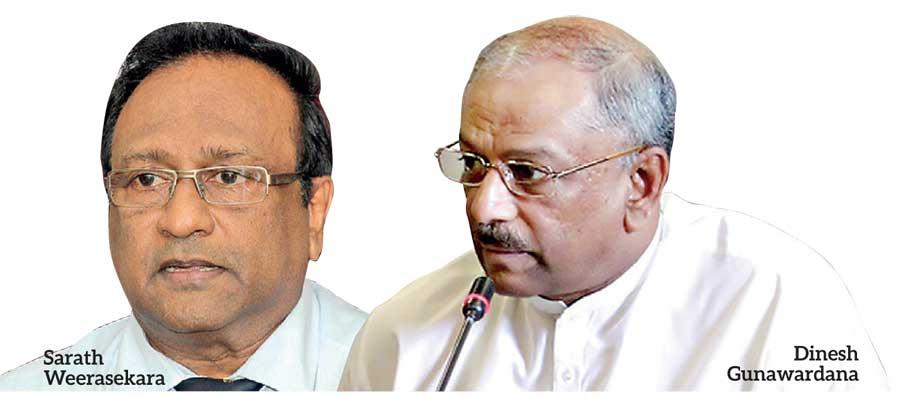31 Mar 2021 - {{hitsCtrl.values.hits}}

According to our Foreign Minister, there is nothing worrisome about the fact that 22 countries supported the UNHRC Resolution on Sri Lanka while only 11 opposed it which effectively means they are in support of Sri Lanka. According to Dinesh Gunawardena, the most important outcome of the Resolution which was passed on March 22 in Geneva is that 14 states abstained from voting. By his logic it is a victory as he touted, “we welcome the majority of 25 of 47 members in the council to have expressed not to vote against SL”, via a tweet. While our intellectual capabilities strain without avail to comprehend the logic, the President, who we may presume, sent the emissaries to UNHRC and might have dictated the stance that we are to take, says boisterously that Sri Lanka will not be pressurized by any foreign power.
 Until our Foreign Minister showed how adept he was in matters related to UN Resolutions and foreign policy in general by declaring Sri Lanka “victorious” in Geneva, we in our mediocre intellect as thought we had lost. More disheartened were we to see that India and Japan, two of our long lasting friends in the international community had abstained from voting rather than opposing the resolution. Now the Rajapaksa loyalist may attribute factors such as India such as the Tamil Nadu Elections and the debacle over the East Terminal of the Trincomalee Harbour as the substance behind India’s decision. They may even explain away Japan’s stance by stating that Sri Lanka’s over reliance on China is one that irks Japan and being the reason for the latter’s abstention.
Until our Foreign Minister showed how adept he was in matters related to UN Resolutions and foreign policy in general by declaring Sri Lanka “victorious” in Geneva, we in our mediocre intellect as thought we had lost. More disheartened were we to see that India and Japan, two of our long lasting friends in the international community had abstained from voting rather than opposing the resolution. Now the Rajapaksa loyalist may attribute factors such as India such as the Tamil Nadu Elections and the debacle over the East Terminal of the Trincomalee Harbour as the substance behind India’s decision. They may even explain away Japan’s stance by stating that Sri Lanka’s over reliance on China is one that irks Japan and being the reason for the latter’s abstention.
In fact, there are many options available to Sri Lanka. One is to remain as obstinate as the Government has been ever since the present President assumed power declaring that we were to withdraw from the co- sponsorship of the Resolution 30/1 brought on by the Ranil-Maithri collation government in October 2015. On the other ends of the spectrum, we can simply cave in to any and every recommendation that might come our way including hybrid courts which any citizen would sense is a serious infringement of our sovereignty. Co-sponsorship was a very unwise, unpatriotic and unwarranted move made by Sri Lanka and admittedly would have done little to foster reconciliation in the post-war Sri Lanka. But unilateral withdrawal backed by trash talking is hardly the way to serve the country’s interests in the Commission.
 " Many of our friends including India and Japan respected our right to protect our sovereignty and territorial integrity. They knew how Sri Lanka had to fight the most ruthless and guerrilla outfit in the world. But at the same time they placed their hopes in the Sri Lankan Governments promises of accountability and reconciliation"
" Many of our friends including India and Japan respected our right to protect our sovereignty and territorial integrity. They knew how Sri Lanka had to fight the most ruthless and guerrilla outfit in the world. But at the same time they placed their hopes in the Sri Lankan Governments promises of accountability and reconciliation"
Then there are other options like making someone like Wimal Weerawansa lie prostrate before the UN Office in Sri Lanka in what was called a hunger strike and then to gratefully accept some porridge from the President when he visited and give up the hungers trike on the latter’s appeal. Or we can send someone like Sarath Weerasekera as the Permanent Representative to the UN and enjoy his theatrics there. But one thing is clear, despite all bravado and balderdash; we are standing on a tripwire that leads to a diplomatic, political, economic and existential disaster.
Although not brilliant as our Foreign Minister is, we do remember that Sri Lanka did win the support of easily more than half of the member states to avert a probe into war crimes at the UNHRC in 2009 in the immediate aftermath of the conclusion of the civil war. The vote was 29-12; and was in our favour! Many countries who are now avoiding supporting us voted in our favour, thus creating a firewall against the western powers who were poking their finger too much in to our internal affairs. At that time disappearances were still taking place, thousands of detainees were in camps or in legal custody. Many of the displaced were still in camps and under military control. Why did we win? How could we?
Many of our friends including India and Japan respected our right to protect our sovereignty and territorial integrity. They knew how Sri Lanka had to fight the most ruthless and guerrilla outfit in the world. But at the same time they placed their hopes in the Sri Lankan Governments promises of accountability and reconciliation. The LLRC and the Maxwell Paranagama Commissions that followed were, at least on face value, were manifestations of the bona fides of our government.
But unfortunately, we all know what came out of the recommendations of those reports and how the Mahinda Rajapaksa regime threw them into the dust bin thus squandering a great chance, an opportunity that we might never have again of firstly reconstructing our social fabric that had been torn to shreds by a brutal ethnic civil war and secondly of warding off the poking hand of the western powers who have always been sympathetic to the Tamil minorities, if not the LTTE itself. The results were the triple defeats that took place in 2012, 2013 and 2014. As much as we blame the “Yahapalana” government for caving in to pressure and of being back-boneless, it also should be borne in mind it was the disastrous policy adopted by Mahinda Rajapaksa regime at the UNHRC that led to the 30/1 co-sponsorship. There was little choice, to be fair.
Now we are back to square one; we have an uphill battle. Do we think we can do what Donald Trump did when he walked out of UNHRC? Or do we emulate Netanyahu’s Israel, walking out of UNHRC? Or do we do another Weerawansa special this time? Or do we send Sarath Weerasekera and sit back in eager anticipation of some amusement in the midst of all despair?
OR, do we adopt a principally pragmatic approach of taking upon our adversaries with well measured, genuine and diplomatic actions that would convince our friends in the international community that we are ready to keep the promises we had made of being accountable about the excesses that were unavoidable in civil war brutality? Do we take measures to implement the recommendations of the LLRC and Paranagama Commissions? Do we show that we are not on a self-isolationist approach and don’t give a fig about being accountable to what our friends expect of us?
We have a lot of friends in the International Community. We have adversaries in the UNHRC but even they are not enemies of our nation state. We are not Israel or North Korea. We need to take the moral and ethical high ground that we were within our rights to defend our tiny land mass. That we are aware that there are areas that need to be accounted for. That we intend to ensure that such incidents do not recur and lead to more civil wars.
Then that type of approach gives us the moral upper hand which we are sure will delight and impress our friends who will eagerly come to our help. The most disturbing thing about what happened a week ago in Geneva is not that we lost the vote and our adversaries won. It is that we lost our friends who had been with us.
But since our Foreign Minster assures us that we won it, all’s good that
ends well!
29 Nov 2024 1 hours ago
29 Nov 2024 3 hours ago
29 Nov 2024 4 hours ago
29 Nov 2024 4 hours ago
29 Nov 2024 5 hours ago